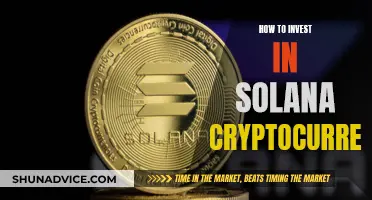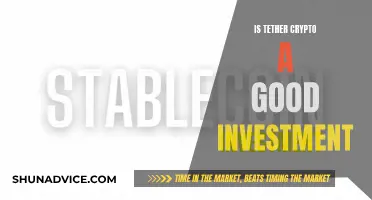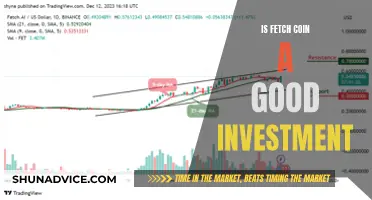
Dogecoin is a cryptocurrency that was initially created as a joke based on the popular meme of a Shiba Inu dog. Despite its lighthearted origins, it has gained a cult status and a dedicated following across social media platforms like Reddit and Twitter. Its popularity is further fuelled by endorsements from billionaires like Elon Musk and Mark Cuban.
If you are looking to invest in Dogecoin, you will need to find a wallet and an exchange that supports the coin and is legally operating within your jurisdiction. You will also need to consider the risks involved, as Dogecoin is highly volatile and unpredictable.
What You'll Learn

Choosing a Dogecoin wallet
First, let's look at the different types of wallets available. Software wallets, also known as hot wallets, are typically more convenient and are usually free. They are connected to the internet, allowing you to access your wallet from anywhere, but this also makes them more susceptible to hacking. Hardware wallets, or cold wallets, on the other hand, are not connected to the internet and are considered more secure. However, they require an upfront purchase and are less convenient for those who engage in frequent transactions.
When choosing a Dogecoin wallet, it is crucial to consider the level of security offered. Cold wallets are generally considered the safest option for storing crypto assets as they are not connected to the internet, making them less vulnerable to online hacks. In contrast, hot wallets may offer features such as encryption and two-factor authentication for added security. It is also important to research the reputation of the wallet provider and their track record for security and reliability.
Additionally, you should consider the features offered by different wallets. For example, some wallets may offer staking rewards, which allow you to earn passive income by holding your Dogecoin in the wallet. Other features to look for include user-friendliness, customer support, and compatibility with different exchanges.
It is also important to note that different wallets may offer different levels of privacy. Decentralized wallets, for instance, often do not require users to provide personal information, while centralized wallets may have stricter Know Your Customer (KYC) and Anti-Money Laundering (AML) requirements.
Lastly, consider the cost of the wallet. Hardware wallets typically require an upfront purchase, while software wallets are usually free. However, it is important to keep in mind that there may be transaction fees associated with using certain wallets, and these fees can vary across different platforms.
In conclusion, when choosing a Dogecoin wallet, it is essential to prioritize security and only use reputable providers. Consider your personal needs and preferences, such as the level of convenience, privacy, and features offered by the wallet. By doing your research and comparing different options, you can make an informed decision that best suits your investment goals and risk tolerance.
The Best Crypto Investment: Which Coin to Buy?
You may want to see also

Selecting an exchange
Centralised exchanges are operated and controlled by a central authority, and users typically need to create an account to trade cryptocurrencies. Examples of popular centralised exchanges include Coinbase, Kraken, Binance, Gemini, and Robinhood. These platforms offer a wide variety of trading pairs, high liquidity, and advanced trading features. They also tend to have strong security measures and customer support teams to assist with any issues.
On the other hand, decentralised exchanges operate on a decentralised blockchain network, meaning they are not controlled by a central authority. Instead, they use smart contracts and blockchain technology to facilitate peer-to-peer trades between users. DEXs are popular among those who value privacy, security, and decentralisation. While they offer a high level of security and privacy, they require more technical knowledge to use and may be more vulnerable to technical vulnerabilities.
When choosing an exchange, it is important to consider several factors to ensure the platform is reputable and reliable. Here are some key factors to keep in mind:
- Security: Look for an exchange with robust security measures such as two-factor authentication, cold storage of funds, and regular security audits.
- Fees: Different exchanges have different fee structures, so compare fees to find the most cost-effective option.
- Supported cryptocurrencies: Ensure the exchange supports the cryptocurrencies you want to trade, including Dogecoin.
- Wallet quality and safety: Choose an exchange that provides a high-quality wallet with strong security features.
- Storage and custody: Select an exchange that offers secure storage and custody solutions, such as cold storage and insurance coverage for theft or loss of funds.
- Regulatory compliance: Check that the exchange complies with Know Your Customer (KYC) and Anti-Money Laundering (AML) regulations and is licensed to operate in your jurisdiction.
- Trading volume and liquidity: Consider the trading volume and liquidity of the exchange, especially if you plan to trade Dogecoin, as this can impact your ability to enter and exit trades.
- User reviews and reputation: Research user reviews and the exchange's reputation to get an idea of how the platform operates and treats its users.
It is also worth noting that some exchanges may offer lower fees for high-volume traders, so it is important to research the fee structure of each platform. Additionally, prices of Dogecoin may vary across exchanges, so look for an exchange with competitive prices.
Small Bitcoin Investment: Worth the Risk?
You may want to see also

Payment methods
Once you have chosen a crypto exchange or brokerage platform, you will need to deposit money into your account. The specific payment methods available to you will depend on the platform and your jurisdiction. However, some common options include:
- Bank transfer from a checking or savings account
- Wire transfer
- Credit or debit card
- PayPal
- Digital gift card
It is important to note that if you use a credit card to purchase Dogecoin, your bank will likely treat the transaction as a cash advance, resulting in additional fees and a higher interest rate. Therefore, experts generally advise against using credit cards to buy cryptocurrency.
After depositing money into your account, you can place an order for Dogecoin by searching for it on the exchange's trading platform and specifying the amount you want to spend or the number of Dogecoins you want to buy.
Bitcoin's Volatile Nature: Why You Should Still Invest
You may want to see also

Storage options
When you buy Dogecoin, it’s usually kept in the crypto wallet provided by your exchange or brokerage by default. These wallets are generally connected to the internet, so some investors prefer to withdraw their crypto and store it in a separate wallet.
You can choose to store your Dogecoin in a hot wallet or a cold wallet outside of your exchange. Hot wallets are digital and connected to the internet, making them more susceptible to hacking. Cold wallets are physical hardware that you can disconnect from the internet, making them less vulnerable to hacking. However, cold wallets are generally more expensive than hot wallets, and you also risk being unable to access your cryptocurrency if you lose or forget the password to your cold wallet.
Crypto wallet manufacturers claim to offer higher levels of protection than exchanges or brokerages. On the other hand, many crypto exchanges offer some kind of insurance to protect cryptocurrency holdings.
Crypto wallets come in two forms: hot wallets and cold wallets. Hot wallets are software-based and connected to the internet. They are more convenient as you can access your wallet from anywhere, but they are also more vulnerable to hacking. Cold wallets or hardware wallets are physical devices that store your crypto offline. They are considered the safest way to store crypto assets, but they are less convenient to use as you must have physical possession of the wallet to access its contents.
Hot Wallets
- Exodus: A widely used software wallet that supports over 200 cryptos, including Dogecoin. Exodus is non-custodial, giving users full control of their private keys. It also offers security features such as PIN protection, biometric login, and auto-lock.
- Atomic Wallet: A trustworthy software wallet that allows users to store their keys in a non-custodial fashion. Atomic Wallet offers additional security features such as AES symmetric encryption and TLS protection.
- Coinbase Wallet: A custodial wallet that supports a range of well-known currencies, including Dogecoin. Coinbase offers security features such as a Vault, which allows you to store your funds separately and prevent immediate withdrawals.
Cold Wallets
- Ledger (Nano X or S): A leading hardware wallet provider, Ledger offers two main models that support the storage of Dogecoin private keys. Ledger wallets use a unique operating system called BOLOS to isolate wallet apps and secure information.
- Trezor (Model T or One): Another popular hardware wallet provider, Trezor offers two models that store your private keys offline. Trezor's firmware is open-source, allowing for continuous vulnerability identification and patching.
- KeepKey: A reputable hardware wallet developed by ShapeShift, a well-known DeFi platform. KeepKey supports over 40 cryptocurrencies, including Dogecoin, and offers security features such as PIN protection and passphrases.
Strategies for Crypto Investment Without Coin Purchase
You may want to see also

Risks and benefits
Dogecoin is a risky investment option. It is a highly volatile cryptocurrency that has seen extreme fluctuations in value. Its price is largely driven by social media hype and the influence of celebrity endorsements. For example, Tesla founder Elon Musk has been dubbed the "Dogefather" for his role in driving up the price of Dogecoin through his social media activity.
The price of Dogecoin can be extremely unpredictable, and investors could lose all their money. It is also important to note that Dogecoin is not a long-term investment asset like Bitcoin. Its value is based on its popularity, and there is a risk that the public will lose interest, causing the price to plummet.
Benefits
Dogecoin has several advantages that make it an attractive investment option for some:
- Potential for massive returns: Dogecoin's low price and high volatility mean there is a chance of huge gains if its value increases.
- Fast transactions and low fees: Dogecoin transactions are much faster than Bitcoin transactions, taking just a few seconds. This makes it a popular choice for online tipping and micropayments.
- High liquidity: Dogecoin's popularity means it is easy to buy and sell, making it attractive to investors who want to quickly liquidate assets.
- Affordable and accessible: Dogecoin is much cheaper than Bitcoin, making it a good entry point for new investors with smaller budgets.
- Solid community support: Dogecoin has a very active and supportive community, with the Dogecoin Foundation working to promote its use and adoption.
Risks
However, there are also several significant risks associated with investing in Dogecoin:
- High volatility: Dogecoin's value is extremely volatile and unpredictable, which means investors could lose money.
- No dividends or interest: Unlike stocks or bonds, Dogecoin does not provide any income in the form of dividends or interest.
- Unlimited supply: There is no limit to the number of Dogecoins that can be mined, which means the price will only increase if investors buy coins faster than miners can produce them.
- Hype-driven rallies: Dogecoin's price surges are often short-lived and driven by social media hype, which can quickly fade.
- Lack of decentralization: Dogecoin's supply is not capped, and its foundation could potentially change its monetary policy, introducing additional risks.
- No intrinsic value: Dogecoin has been called a "joke" or "meme" coin, and it has been suggested that it has no intrinsic value, making it a highly speculative investment.
- Security concerns: Cryptocurrency exchanges and wallets are vulnerable to hacks and crashes, which could result in the loss of funds.
In summary, Dogecoin has the potential for massive gains, but it is a highly risky and volatile investment. It may be a good option for short-term traders looking for a fun, speculative asset, but it is not suitable for long-term investors or those seeking a stable, secure investment.
Elon Musk's Bitcoin Bet: Millions Invested
You may want to see also
Frequently asked questions
You can buy Dogecoin on a cryptocurrency exchange, such as Coinbase, Binance, Kraken, or Gemini. You can also access Dogecoin through investment apps like Robinhood, SoFi, Webull, and eToro.
Dogecoin is a highly volatile and unpredictable asset. Its price is driven by social media movements and hype, and there is no limit to how many Dogecoins can be created. As such, it is important to only invest an amount you are willing to lose.
You can store your Dogecoin in a crypto wallet, either a hot wallet or a cold wallet. Hot wallets are digital and connected to the internet, while cold wallets are physical hardware that you can disconnect from the internet. Cold wallets offer greater security but are less convenient to use.
The cost of Dogecoin varies depending on the exchange and market conditions. As of August 2024, it costs around $0.10 to buy one Dogecoin.







